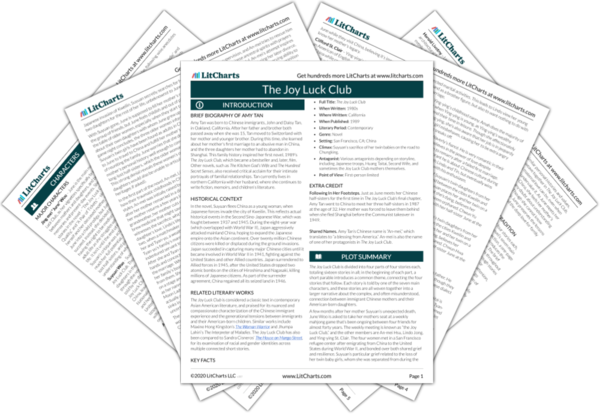The notion of fate permeates the novel, as the protagonists waver between the traditional acceptance of a singular destiny and the opportunity to decide their own fates. The mothers often refer to the Chinese belief of predetermined outcomes; in particular, they regularly mention Chinese zodiac characters established by birthdates, which supposedly dictate personalities and personal weaknesses. Still, a common thread in all the stories is the ability to break out of one’s preordained life to pursue a more positive direction. As a child, Lindo is arranged to be married to Tyan-yu, a spoiled boy from a rich family. Once she’s folded into the family, more as a servant than a wife, Lindo initially resigns herself to the harsh life. She changes her mind when she sees her marriage candle blow out, signaling an inauspicious end to her marriage. When the candle is lit again in the morning, she knows someone artificially maintained the light, not fate itself. She then constructs a plan to scare her in-laws into releasing her from the marital contract and paying her way to America. Though fate might have delivered her to such circumstances, it is her own will and ingenuity that construct the solution and change the course of her life.
Similarly, An-mei’s mother refuses to accept her abusive lot in life, especially as her children suffer alongside her. Though seemingly fated to live with her shame, An-mei’s mother decides to kill herself at a time when her husband cannot refuse her anything, thus placing An-mei and her baby brother in a position of power. Though she dies, in doing so An-mei’s mother decides her own destiny and the fortune of her children. Though the traditional Chinese belief in predetermined fate exists and determines much of a person’s life, The Joy Luck Club reminds the reader that there is always room for free will to alter the future for the better.
Fate and Autonomy ThemeTracker

Fate and Autonomy Quotes in The Joy Luck Club
Maybe I never really gave myself a fair chance. I did pick up the basics pretty quickly, and I might have become a good pianist at that young age. But I was so determined not to try, not to be anybody different that I learned to play only the most ear-splitting preludes, the most discordant hymns.
That’s what she is. A Horse, born in 1918, destined to be obstinate and frank to the point of tactlessness. She and I make a bad combination, because I’m a Rabbit, born in 1951, supposedly sensitive, with tendencies toward being thin-skinned and skittery at the first sign of criticism.
Ted pulled out the divorce papers and stared at them. His x’s were still there, the blanks were still blank. "What do you think you’re doing? Exactly what?" he said.
And the answer, the one that was important above everything else, ran through my body and fell from my lips: "You can’t just pull me out of your life and throw me away."
The minute our train leaves the Hong Kong border and enters Shenzhen, China, I feel different. I can feel the skin on my forehead tingling, my blood rushing through a new course, my bones aching with a familiar old pain. And I think, My mother was right. I am becoming Chinese.
















